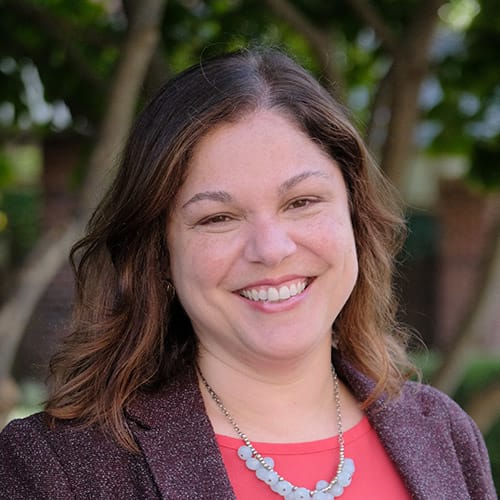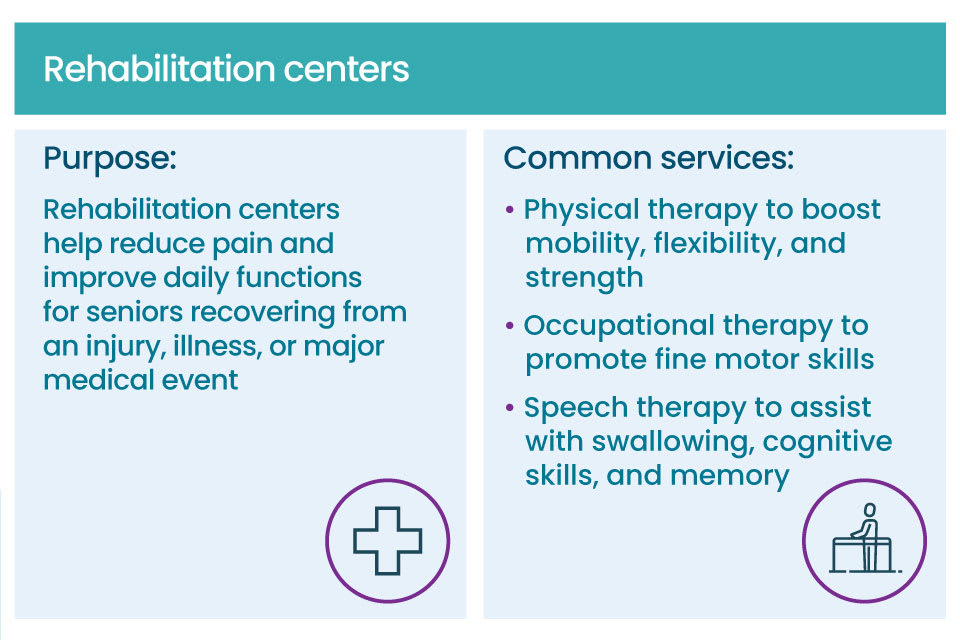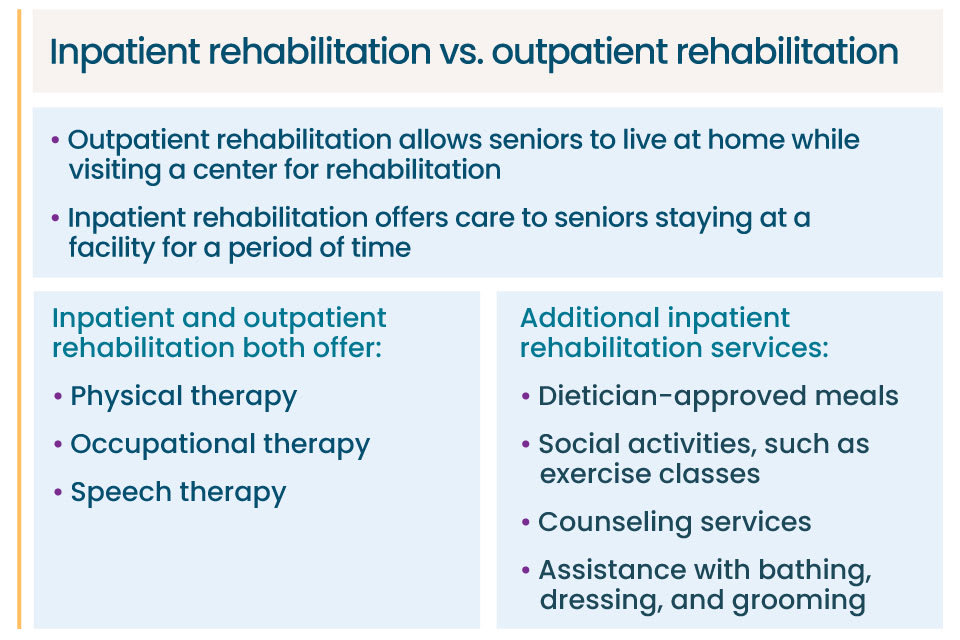
Senior Rehab: Better Care Options After a Hospital Stay

Is your family trying to decide where an elderly loved one will complete rehab after they’re discharged from the hospital? From skilled nursing homes that offer 24-hour care to rehab services that can be carried out at home or in an assisted living community, you have options that will help your loved one get better as quickly and safely as possible. Read on to also learn about the importance of rehab, types of rehab therapies, typical costs, plus questions to ask after an elderly loved one’s hospital stay.
Let our care assessment guide you
Our free tool provides options, advice, and next steps based on your unique situation.
Key Takeaways
- Senior rehab centers help seniors efficiently recover after a hospital stay. Rehab centers have robust medical equipment and professional rehabilitative therapists to help seniors get back on their feet.
- There are numerous therapy types. Your loved one's doctor may recommend physical, occupational, or speech therapy depending on their needs after hospitalization.
- Senior rehab is offered in multiple locations. Seniors can reside in a skilled nursing facility, move to an assisted living facility, or receive rehabilitative home health care services.
- It’s crucial to make a discharge plan after your loved one’s hospital stay. Ask their doctor about care expectations and steps you can take to help them recover.
What is senior rehabilitation?

Senior rehabilitation is a type of specialized, post-hospital care that helps elderly adults recover from an injury or serious medical event. Rehab for elderly patients after a hospital stay can be done at a rehab facility or through rehab services done in the senior’s home or assisted living community.
Rehab therapies help to reduce pain and improve the senior’s overall function so they can regain their independence and health. Elderly rehabilitation facilities or senior rehab centers offer a range of rehabilitative therapies for various conditions.
Types of rehab therapies provided at a senior rehab center
Senior rehabilitation centers offer several types of rehab therapies. After-hospital care for the elderly typically includes one or more of the following rehabilitative therapies:
- Physical therapy helps improve mobility, balance, flexibility; increase strength; and manage pain. It’s commonly recommended after a serious injury and can also help alleviate pain from chronic conditions.
- Occupational therapy assists with activities of daily living (ADLs), use of adaptive equipment, or fine motor skills. It’s commonly recommended for seniors recovering from an injury, illness, or stroke.
- Speech therapy helps with conditions that affect communication, swallowing, or cognitive skills such as attention or memory problems. It’s typically recommended after a stroke or injury that affects the brain.
Common medical events that may require rehab after a hospital stay
The majority of seniors go to rehab for musculoskeletal problems and joint replacement.[01] Other common conditions include strokes and severe infections like pneumonia. Although these conditions lead to the highest rehab admittance among seniors, they aren’t the only conditions that require rehabilitative therapy.
Other common conditions that require rehab for elderly after a hospital stay or a stay at a senior rehab center include the following:[01,02]
- Broken or fractured joints
- Joint or hip replacement
- Parkinson’s disease
- Cardiac events (heart attack, cardiovascular disease, etc.)
- Arthritis
- Osteoporosis
- Cancer
- Mobility issues (frequent falls)
Rehab after surgery for elderly adults is also common.[02] It can be difficult to readjust at home after certain surgeries, so doctors sometimes recommend going to a rehab center after surgery.
Why rehab is important for seniors
“After a hospital visit, it’s important for seniors to have a maximum chance of recovery,” says Maureen Bradley, a senior living expert at A Place for Mom. “Whether the issue at hand is mobility, pain, or cognitive skills, rehab centers provide the widest range of resources to help seniors confidently get back on their feet.”
Bradley has worked in the senior living industry for over two decades and has routinely guided families who’ve dealt with a senior loved one’s recovery after a rehab stay. Bradley says rehab also benefits the family. It gives families a break and peace of mind, as equipped and trained professionals help their loved one recover from a recent hospitalization.
Inpatient and outpatient rehabilitation services for the elderly

Senior rehabilitation centers may offer inpatient and outpatient services. Your loved one may need inpatient rehabilitation if they need around-the-clock care and continuous monitoring. Learn more about the differences between the two types of rehab:
- Inpatient rehab requires people recovering from a serious injury, debilitating disease, or major surgery to stay at a facility for a period of time. This type of rehab allows for intensive care that generally includes daily physical, occupational, or speech therapy. Inpatient rehab facilities may offer dietician-approved meals, exercise classes, social activities, and counseling services on top of skilled medical care and assistance with daily activities, such as bathing and getting dressed.
- Outpatient rehab enables seniors to visit a rehab center for therapy appointments — typically several times a week — to complete their course of rehabilitation. Outpatient rehab offers physical, occupational, and speech therapy services that can be provided in the senior’s home or assisted living facility.
Short-term vs. long-term rehabilitation for elderly patients
Some senior rehab centers offer both short- and long-term inpatient rehab options. Your loved one’s health will dictate how much rehab they need.
For example, after a minor surgery, your parent may only require a short stay at a senior rehab center. However, chronic, serious conditions, such as heart problems or a stroke, may require several months of rehab services at a skilled nursing home that provides 24-hour care, seven days a week.

Let our care assessment guide you
Our free tool provides options, advice, and next steps based on your unique situation.
You may be curious how long seniors typically stay in a rehab facility, but there’s no figure for an average stay in rehab after a hospital visit because the time greatly varies depending on a senior’s medical condition and overall health.
Your loved one’s doctor will consider the severity of their illness or injury to determine the type of rehab program they need. Together, you can decide if your parent is most likely to achieve rehab goals safely at a skilled nursing facility or through a different rehab option.
Choosing a senior rehabilitation location after hospitalization
Senior rehabilitation can take place in a variety of settings. To decide where your loved one will receive care, you’ll want to talk to their doctor and think about their needs, budget, and preferences.
Senior rehab therapy at skilled nursing facilities
Skilled nursing facilities (SNFs), also called rehab hospitals, offer short-term housing and rehabilitation services for people who require 24-hour nursing services and skilled medical care. These inpatient rehab facilities typically have a clinical environment with hospital beds and shared rooms. Meals, dietary counseling, activities, and social services are often provided.
The median monthly price of a skilled nursing facility is approximately $7,908 for a semi-private room and $9,034 for a private room.[03] Approved skilled nursing facilities may be covered by Medicare as long as your loved one enters the skilled nursing facility within 30 days of an inpatient hospital stay that lasted at least three days.
Elderly rehabilitation at assisted living communities
Many people aren’t aware that rehabilitation can also be completed in assisted living communities. In fact, several assisted living facilities in A Place for Mom’s nationwide network offer on-site rehabilitation services. Here’s a breakdown of what’s offered by type of therapy:[04]
- About 80% of partner assisted living facilities offer visiting physical therapists.
- About 50% of partner assisted living facilities offer visiting occupational therapists.
- About 48% of partner assisted living facilities offer visiting speech therapists.
Those health care professionals can provide specific therapies and nursing services that are paid for by Medicare, Medicaid, or private insurance.

Talk with a Senior Living Advisor
Our advisors help 300,000 families each year find the right senior care for their loved ones.
Aside from visiting specialists, most of our partner assisted living communities also have on-site physical and occupational therapy rooms. These rooms enable residents to take advantage of high-tech equipment multiple times throughout the day, with the added benefit of 24-hour assistance from the assisted living community staff.
The median price of assisted living is approximately $4,807 per month, according to A Place for Mom’s most recent partner community data.[05]
For seniors looking for a short-term stay, ask about a short-term respite care stay at an assisted living community. Approximately 75% of our assisted living partners across the nation offer respite care services for families in need of short-term options.[04] A respite stay at an assisted living facility may be a good option for a loved one who still requires some support after an inpatient rehab or hospital stay. This option is ideal for a senior who isn’t confident enough yet to go home alone.
Respite care can allow a senior to have the peace of mind that someone is available 24 hours a day for assistance and for immediate response to emergencies. It can also provide family caregivers a much-needed break as trained professionals care for their loved one.
In-home rehab for elderly after a hospital stay
Some senior rehabilitation services can be carried out in the home through home health agencies. Home health services may be paid for by Medicare, Medicaid, or long-term care insurance. The median price of in-home health care is approximately $5,148 per month, according to Genworth.[03]
Home health services are provided by licensed medical professionals who come to the home to do a specific task that has been ordered by a physician. These tasks may include monitoring vitals, administering injections, providing wound care, or facilitating a physical therapy exercise program.
Home health rehab therapy can only be offered a few times a week. This means that seniors who receive these services must be motivated to follow their rehab program when the therapist isn’t there. This option may be best for seniors who have family members around the home to help throughout the day. Family members should make sure safety measures are followed and help their loved ones stick to their recommended regimen.
Remember that in-home therapies might lack the peer support and socialization that can be provided in skilled nursing facilities and assisted living communities. That support and socialization often gives seniors the extra motivation they need as they recover.
Questions to ask about your loved one's hospital discharge plan
To help determine your loved one’s recovery options, ask their doctor these questions before leaving the hospital:
- What therapies will my parent require?
- What services will Medicare or other health insurance pay for?
- Will my parent need help with dressing or bathing?
- Will my loved one need help with cooking and housework?
- Will my loved one be safe at home upon discharge, or will someone need to be with them 24 hours a day?
- What’s the average length of recovery time for my loved one’s specific condition?
- What problems, symptoms, and side effects should we watch for?
- What should we do about any potential side effects or problems?
- What does each medicine do, and why is it needed?
- What are the medication dosages and side effects?
- Who do we call if we have questions about medical equipment, such as oxygen or a walker?
Thinking about long-term care after senior rehab
While it’s often a family’s goal to get their loved one home after rehab, that might not be a feasible option. Some serious medical conditions may make staying at home dangerous, so it’s important to consider different options.
“Oftentimes, families expect their loved one to come home after an inpatient rehab stay, however it’s not always an option,” Bradley says. “Many families are provided a short notice — often 48 hours — before their loved one’s discharge that their loved one can no longer stay at the rehab facility, but they’re also not safe to return home.”
Common situations, like the one Bradley describes, put families in a bind. They may not have considered other options, leaving them a small window to find a suitable place for their loved one. This is where a hospital social worker or case manager can help. Case managers can put families in touch with A Place for Mom’s health care account executives, who work in hospitals to help families lay out potential options for post-hospital care. They might recommend a move to either a skilled nursing or assisted living facility, environments that can provide crucial, long-term care services depending on your loved one’s specific needs.
If families decide they’d like to go the senior living route, our health care account executives will recommend contacting a Senior Living Advisor. Our advisors do their best to provide several local options based on your aging loved one’s rehabilitative needs, care needs, budget, and preferences.
Key Takeaways
Tijsen, L. M. J., Derksen, E. W. C., Achterberg, W. P., & Buijck, B. I. (2019, August 12). Challenging rehabilitation environment for older patients. Clinical Interventions in Aging.
Gell, N. M. & Patel, K. V. (2018, October 8). Rehabilitation services use among older adults according to fall-risk screening guidelines. Journal of the American Geriatrics Society.
Genworth. (2021). Cost of Care Survey.
A Place for Mom. (2023). A Place for Mom proprietary data.
A Place for Mom. (2023). A Place for Mom proprietary medial price index.
The information contained on this page is for informational purposes only and is not intended to constitute medical, legal or financial advice or create a professional relationship between A Place for Mom and the reader. Always seek the advice of your health care provider, attorney or financial advisor with respect to any particular matter, and do not act or refrain from acting on the basis of anything you have read on this site. Links to third-party websites are only for the convenience of the reader; A Place for Mom does not endorse the contents of the third-party sites.
Make the best senior care decision
Make the best senior care decision